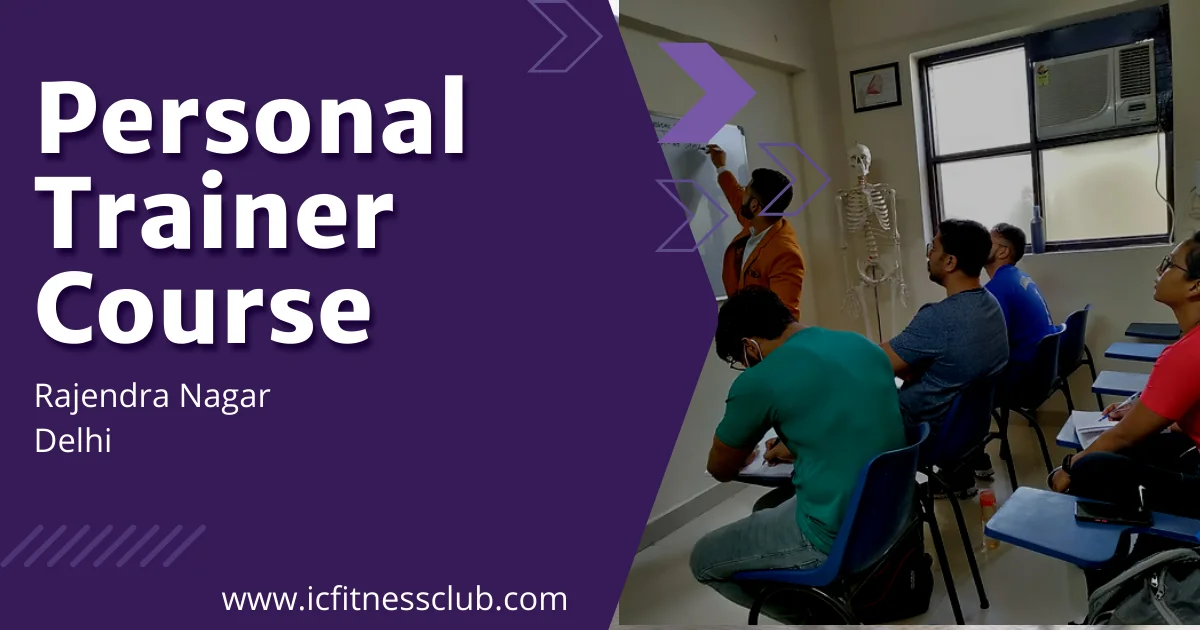Personal Trainer Course in Rajender Nagar Delhi – IC Fitness Club
A personal trainer course in Rajender Nagar Delhi is a program designed to provide individuals with the knowledge and skills needed to become a certified personal trainers. These courses typically cover topics such as anatomy and physiology, exercise science, nutrition, client assessment and program design, communication and coaching skills, and business and marketing strategies.
Personal trainer courses are offered through IC Fitness Club to build stellar careers in the fitness industry.
They may also be offered in-person or online, and can range in length from a few weeks to several months or more, depending on the program and the level of certification being sought.
Successful completion of a personal trainer course and passing IC’s certification exam is required to become a certified personal trainer.
Syllabus of Personal Trainer Course
General overview of the topics that may be covered in a personal trainer course:
- Anatomy and Physiology: This covers the structure and function of the human body, including the skeletal, muscular, cardiovascular, respiratory, and nervous systems.
- Exercise Science: This includes principles of exercise physiology, biomechanics, and kinesiology, and how they apply to design safe and effective exercise programs for clients.
- Nutrition: This covers the basics of nutrition, including macro- and micronutrients, dietary guidelines, and special considerations for athletes and clients with specific health conditions.
- Client Assessment and Program Design: This covers the process of conducting client assessments, including health and fitness assessments, and designing exercise programs based on individual needs and goals.
- Communication and Coaching Skills: This covers effective communication strategies, motivational interviewing techniques, and coaching skills to help clients stay motivated and engaged.
- Business and Marketing Strategies: This covers the basics of starting and running a personal training business, including marketing, sales, and financial management.
- Legal and Ethical Considerations: This covers the legal and ethical considerations of being a personal trainer, including liability issues and maintaining professional boundaries with clients.
- Certification Exam Preparation: This may include practice exams, review sessions, and test-taking strategies to prepare for the certification exam.
Why choose Fitness Industry?
There are several reasons why someone may choose to pursue a career in the fitness industry:
- Passion for fitness: Many people who choose to work in the fitness industry have a genuine passion for health and fitness, and want to help others achieve their fitness goals.
- Personal fulfillment: Working in the fitness industry can be incredibly rewarding, as you get to see the positive impact you are having on your clients’ lives.
- Job stability: The fitness industry has seen steady growth in recent years, and there is a high demand for qualified fitness professionals. This can provide a sense of job security and stability.
- Flexibility: Many fitness professionals work as independent contractors or own their own businesses, which can provide a great deal of flexibility in terms of scheduling and work-life balance.
- Variety: There are many different career paths within the fitness industry, including personal training, group fitness instruction, health coaching, and sports conditioning, among others. This can provide opportunities for individuals to find a niche that aligns with their interests and skills.
Overall, choosing a career in the fitness industry can be a fulfilling and rewarding choice for those who are passionate about health and fitness and want to help others achieve their goals.
Responsibility of a Personal Trainer
The responsibilities of a personal trainer typically include the following:
- Conducting client assessments: This includes evaluating a client’s health history, fitness level, and goals to create an individualized exercise program.
- Demonstrating exercises: Personal trainers are responsible for demonstrating proper exercise form and technique, and monitoring clients to ensure they are performing exercises safely and effectively.
- Providing motivation and support: Personal trainers are responsible for keeping clients motivated and engaged, and providing support and guidance throughout their fitness journey.
- Monitoring progress: Personal trainers are responsible for tracking their clients’ progress and making adjustments to their exercise program as needed to ensure they are on track to meet their goals.
- Providing nutrition guidance: Personal trainers may provide basic nutrition guidance to clients, such as information on healthy eating habits and the role of nutrition in achieving fitness goals.
- Maintaining a safe and clean environment: Personal trainers are responsible for ensuring that the fitness facility is safe and clean, and that equipment is properly maintained and used.
- Adhering to professional standards and ethics: Personal trainers are responsible for upholding professional standards and ethical guidelines, including maintaining client confidentiality and respecting client boundaries.
Overall, the primary responsibility of a personal trainer is to help clients achieve their fitness goals safely and effectively while providing motivation and support along the way. This involves a combination of technical knowledge, coaching skills, and interpersonal communication.
Scope in the Fitness Industry
The fitness industry has a wide range of career opportunities and is continuously growing. Here are some of the career paths available in the fitness industry:
- Personal Training: Personal trainers work with individuals to develop and implement customized fitness programs that help clients achieve their fitness goals.
- Group Fitness: Group fitness instructors lead fitness classes for groups of people, such as yoga, spinning, or Pilates classes.
- Nutrition Coaching: Nutrition coaches work with clients to develop healthy eating habits and provide guidance on nutrition and diet.
- Strength and Conditioning: Strength and conditioning coaches work with athletes to develop and implement training programs to enhance their athletic performance.
- Fitness Management: Fitness managers oversee fitness facilities, staff, and operations.
- Sports Medicine: Sports medicine professionals work with athletes to prevent and treat injuries.
- Fitness Technology: The fitness industry is increasingly incorporating technology, creating opportunities for fitness tech developers and designers.
The fitness industry also has opportunities for entrepreneurship, with many personal trainers and fitness professionals starting their own businesses. Additionally, as people become more focused on health and wellness, the demand for fitness professionals is likely to continue to grow.
to know more about IC’s Personal Trainer Course Visit below




